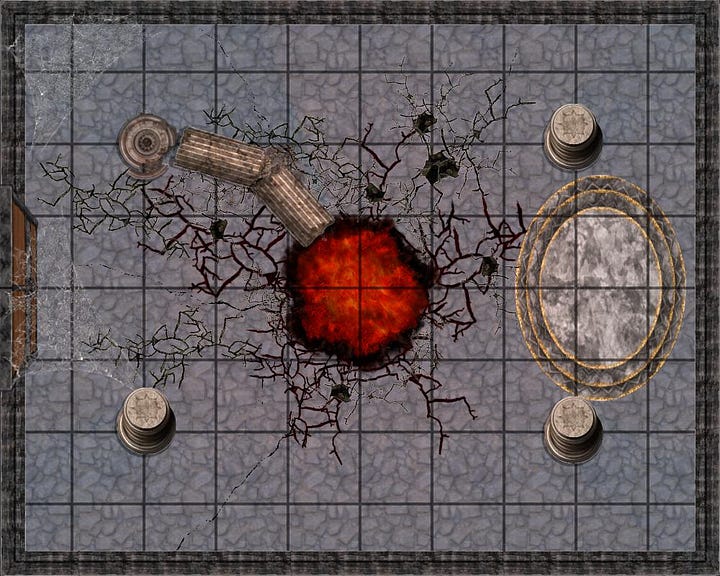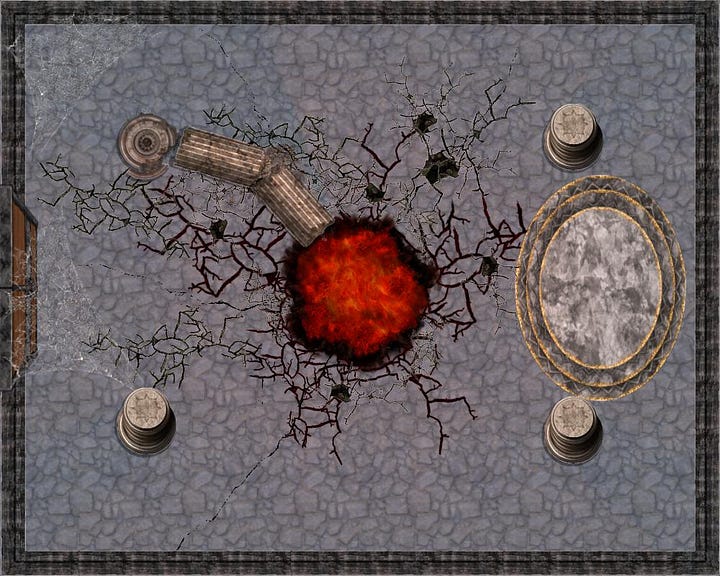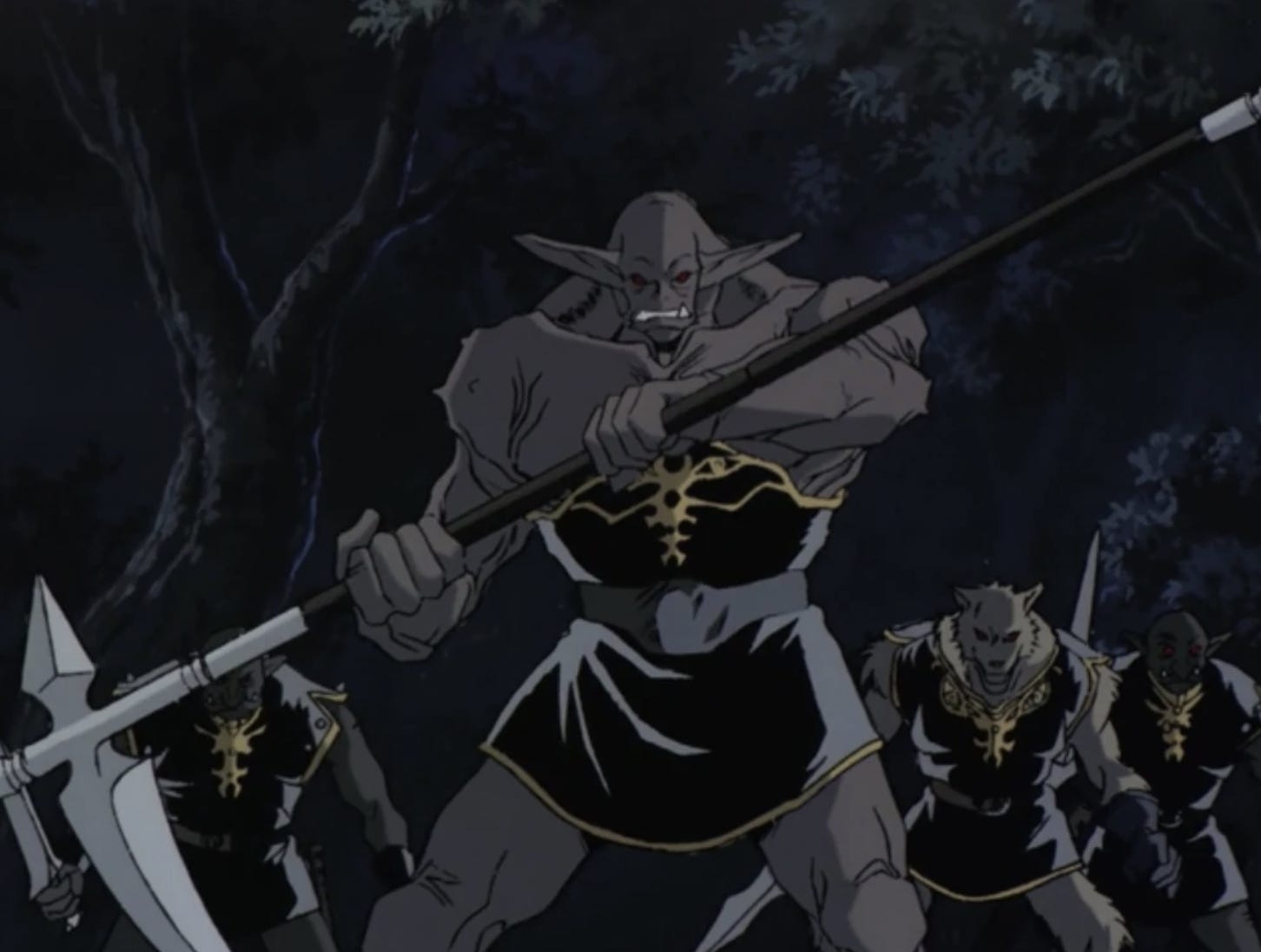Welcome to our RPG community newsletter!
Hi. I’m K.J. We’ve got a bit of extra content for you today.
First,
returns with episode 6 of his insightful episode analysis of Record of Lodoss War.- also returns with a free map offering.
Lastly, I provide a few different talking points.
✏️ Wrote: Record of Lodoss War - Episode Analysis, Part 6: The Sword of the Dark Emperor
Special guest writer CJ Weigel
From Crunchyroll:
After Beld’s forces wreak havoc in Valis, Parn’s group splits—some helping the injured while others report back to King Fahn. The king tells Parn the story of a heroic knight who saved a princess at the cost of disgrace.
Hello again! This article, we’ll be diving into another role-play heavy episode. Check out my Patreon for a free one-page outline of a royal ball, with 10 NPCs and an event chart to inspire you!
The pacing in episode six was weird to me; the last episode ended with the party in the court of King Fahn, but this one starts with the party returning to King Fahn, having just left Wort the Sage’s castle. The non-linear story has finally untangled; as you may recall, the first episode had the party traveling from King Fahn’s castle to that of Wort.
Odd pacing aside, this is a great episode for character growth. Parn, once eager to go to war for honor and glory, now sees the horrors of war first hand. This kind of tonal shift can drive home the theme of a campaign more than merely harping on it every session, and it gives the players a chance to explore their characters more thoroughly. Parn is shocked, but tries to maintain his idealism; Deedlit is saddened, but in her elvish nature seems to get over it quickly; Woodchuck is bitter and disillusioned, clearly already familiar with this kind of bloodshed. That stuff is wonderful at the table, and providing space for that kind of role-play can make the occasional easy night for the GM. All you need to do is sit back, listen to the players talk, and occasionally provide extra details for them to absorb!
Parn’s backstory is explored, and it’s revealed that his father was a truly honorable knight who valued justice over law. It probably goes without saying, but in a narrative-focused game, it’s invaluable to explore the character’s backstories and tie them into the greater story. We also see even more development of foils and contrasts between characters. The Holy Knights vs the monsters of Marmo, Ashram vs Parn, and now Pirotess the dark elf vs Deedlit. I already touched on this last episode, but remember that introducing dark reflections of your PCs and their favorite NPCs can be a great tool!
We end the episode with an ambush on King Kashue’s forces, setting up for some fun action next episode! But what have we learned from this one?
Antagonists should have differing objectives. An interesting and compelling story will naturally arise from your game if you have multiple antagonists - I try to work in two or three - with overlapping but conflicting goals. Beld clearly wants to kill Fahn; Wagnard wants the power that Kardis can offer; Karla seems motivated to maintain balance. All them of are working together for now, but you know villainous alliances never last!
Tonal shifts are powerful. In my experience, you usually rely on the players to bring a bit of comedy to the table. Even if you want an earnest campaign, it’s good to lean into that. When you’re ready to drive home your greater point - such as the horror of war, the cost of avarice, etc - the contrast brings that point into sharp clarity.
Split the party (with caution). If groups within the party have different long-term objectives, remind them that they can split up. One group stays behind to help the survivors of a raid, while another travels on to deliver word to the king. The players will know that this is a risky choice, but if they only have time for one or the other, they have to make a choice.
Free Map from Schlau of Light in Darkness Gaming




Schlau from Light in Darkness Gaming once again has a free map for readers! You can access all four variations shown above via this Dropbox link. Stay tuned as this is just the first part in a series that builds out a composite dungeon.
While you’re at it, check out his other maps on Patreon. You can also see past commissions on Ko-fi as well as request one for your own project.
📖Read
I allotted all of 2024’s reading time strictly to RPG material. Now that’s it’s 2025, I’ve returned to my local library and “regular” books (alongside RPG content). I just finished Old Man’s War by John Scalzi. Only 150-ish more books on my To-Read List.
Have you enjoyed a good book lately? Tell me about it in the comments below.
🧠Tips & Tricks
Some thoughts about fighting the churn of always producing something
After a longer than anticipated hiatus, I’m returning to creating tabletop RPG material. Why the long break?
Like most creators, I suffered burnout - but also, something deeper. Once you get into the spaces and places where other creators are, you’ll quickly find a continual…churning. Something is always being released. A Kickstarter is always being announced. Someone has just published their newest edition of something.
It’s exhausting, and if you’re finite like me, there’s only so many hours in the day to create - if you’re even feeling creative when that time you allotted in your schedule to be creative arrives. You can quickly start to feel (or even be) forgotten in said churn mentioned earlier.
It’s been said that celebrities prefer bad news over no news, because visibility keeps you marketable and relevant. The creative process feels like quicksand, where you’re struggling to keep your head up and hoping you’ll come out with something worth all the effort.
It’s here I want to emphasize something: Your level of productivity doesn't justify your existence.
You can grind. You can churn. You can keep posting so that folks don’t forget you (unless constant posting annoys them and they go ahead and mute you). Being still or silent brings out heavy FOMO feelings for many of us.
But is this - producing endlessly out of a FOMO or becoming invisible or irrelevant - the best root system from which to create something?
Recently, I watched this from Big Think (featuring Oliver Burkeman):
When I first started Watch Well Games, I committed to sharing what it feels like to be a new, indie game creator so others could have a heads-up unlike I did going into this. All the years leading up to this, I performed and felt relevant because I was already on stage in the spotlight with my peers. I showed up and already had an audience because I was a part of some planned performance. Other folks had done the marketing, promoting, and advertising. With indie game creating you as a one-human show have to convince folks that your game is worth buying AND playing (hoping they don’t download it only to file it away with all their other RPG pdfs) - or hire someone to do all that marketing, promoting, and advertising for you.
I’d like to say making tabletop RPG materials is simply a matter of “If you build it, they will come” - but that simply isn’t true. You have to do far more than just make a decent game with decent mechanics and decent artwork. The churn of seemingly never-ending production spins faster than a revolving door with too much oil on its center shaft.
Bottom Line: The churn will fight against the passion within many of us. It can start to feel that if you’re not producing something at a certain level, then you’re not valued/important/accepted/gifted/good enough/something-else-relevant-to-your-struggle. Watch the video above. Be encouraged. You are valued beyond what you do produce. And when you’re ready, create out of a renewed passion - even if it requires you to take a hiatus first.
What to expect this year from Watch Well Games:
Moments of Mirth: Vol. 3 - The Janky Dragon Inn, a Dragonbane supplement
No Clout - a solo pocket game that can be easily expanded to a group
Tenebrosity Falls - a smaller game of mine that blends dungeon crawling with lore and narrative storytelling
[Redacted Title] (a game I’ve been building for 4+ years now) - Quick Start
…maybe more
What are you looking forward to creating this year?
That’s a wrap. Here’s some trivia for the curious:
Greek philosopher Anaximander of Miletus (c. 610–546 BCE) is one of the world’s first cartographers. Here’s what his map of the world may have looked like.
Theophilus Van Kannel invented the revolving door. He initially referred to it as the “New Revolving Storm Door.”


















Good to see you are returning to creating. Some interesting projects outlined and the title redacted sounds intriguing. 5*